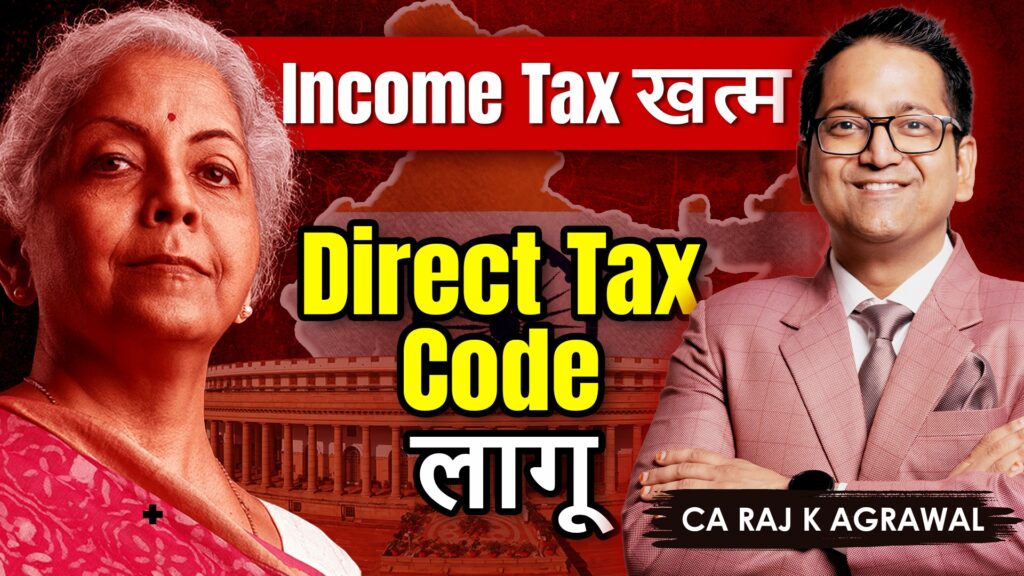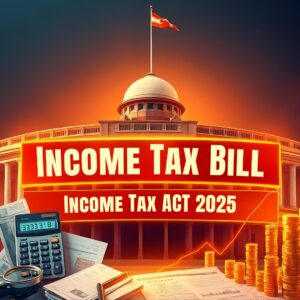
Direct Tax Code 2025: A Comprehensive Guide to the New Tax System
Understanding the Direct Tax Code 2025: Key Changes and Insights
The Direct Tax Code 2025 will replace the Income Tax Act of 1961, bringing long-anticipated reforms. This new law will modernize India’s tax system by introducing simpler and more transparent tax regulations. After several delays, the government will implement the Direct Tax Code 2025 starting in April 2025, with the financial year 2025-26.
Finance Minister Nirmala Sitharaman introduced the Direct Tax Code 2025, marking a significant step toward transforming how individuals and businesses comply with tax regulations. This new code simplifies the previous complex laws, reduces litigation, and encourages better compliance.
In this article, we dive deep into the key aspects of the Direct Tax Code 2025 and explain why it’s crucial for taxpayers and professionals preparing for exams like CA, CS, and CMA.
Why Was Direct Tax Code 2025 Introduced?
The Direct Tax Code 2025 has been under development for over a decade. The government initially drafted it in 2009 and presented it in 2010 but encountered several delays in implementing it. The complexity of the existing Income Tax Act, outdated provisions, and the need for modern reforms made the Direct Tax Code 2025 essential.
The Income Tax Act of 1961 grew overly complex, with hundreds of sections, exemptions, and deductions that people found difficult to understand and follow. The government recognized the need for simpler and more transparent tax laws to improve compliance.
One of the primary goals of the Direct Tax Code 2025 is to increase the number of people paying income tax. Currently, only about 1% of the population contributes to the tax system. With the new code, the government aims to raise this figure to 7.5%, expanding the taxpayer base.
Major Changes in Direct Tax Code 2025
The Direct Tax Code 2025 introduces several important changes that simplify the taxation process while broadening the tax base. Here are some of the key highlights:
-
Simplified Residential Status:
The new system classifies taxpayers solely as residents or non-residents. It removes terms like Resident but Not Ordinarily Resident (RNOR), simplifying the process.
-
Removal of Assessment Year and Previous Year Concepts:
The DTC 2025 eliminates the concepts of Assessment Year (AY) and Previous Year (PY). From now on, you will only consider the Financial Year (FY), streamlining tax filing.
-
Changes in Capital Gains Taxation:
The DTC 2025 includes capital gains as part of normal income, which means you may face higher tax rates on capital gains.
-
New Definitions for Income Categories:
The five heads of income remain, but some categories get renamed. For example, “Income from Salary” becomes “Employment Income,” and “Income from Other Sources” becomes “Income from Residuary Sources.”
-
Unified Tax Rates for Companies:
The DTC 2025 introduces a common tax rate for both domestic and foreign companies, simplifying compliance for multinational businesses.
-
Reduction in Deductions and Exemptions:
The DTC 2025 eliminates most current deductions and exemptions, making tax filing easier and reducing loopholes.
-
Tax Audit Changes:
The DTC 2025 may allow CS and CMA professionals to conduct tax audits, a responsibility previously reserved for Chartered Accountants (CAs).
-
TDS and TCS on Most Income:
The new system will apply Tax Deducted at Source (TDS) or Tax Collected at Source (TCS) to almost all forms of income, increasing regular tax payments.
-
Simplified Structure:
The current Income Tax Act includes 298 sections, several sub-sections, clauses, and 14 schedules. The Direct Tax Code 2025 simplifies this by reducing the number of sections to 319 and increasing the schedules to 22.
-
Impact on Political Parties:
While the Direct Tax Code 2025 aims to boost tax revenue, it continues to exempt political parties, a point that has raised concerns among taxpayers.
Will the Income Tax Act or Direct Tax Code apply for CA, CS & CMA Exam?
Students preparing for professional exams like CA, CS, and CMA often worry about whether the Direct Tax Code 2025 or Income Tax Act will be applicable for exam or not. Here’s some clarity:
The DTC 2025 will only apply to exams conducted from April 2026 onward. If you’re appearing for exams before March 2026, you will still study under the Income Tax Act of 1961. Students currently preparing can focus on the existing law without worrying about any immediate changes.
Watch the Full Breakdown of Direct Tax Code 2025 on YouTube
We had provide a detailed breakdown of the Direct Tax Code 2025 in our YouTube video. Watch it for an in-depth explanation of the changes and how they will affect taxpayers and professionals.
Watch DTC Video in English
Watch DTC Video in Hindi
Free Income Tax & GST Resources for CA, CS, CMA Students
Moreover, if you’re preparing for CA, CS, or CMA exams, we strongly recommend our Income Tax & GST video series on the Study At Home YouTube channel. These resources will help you excel in your exams. Make sure to subscribe and check out the must-watch playlists for a comprehensive understanding of tax laws.
Income Tax AY 2024-25 Free Lectures
GST Free Lectures








